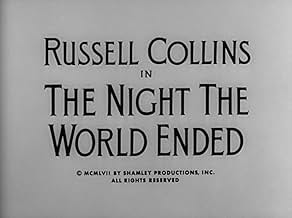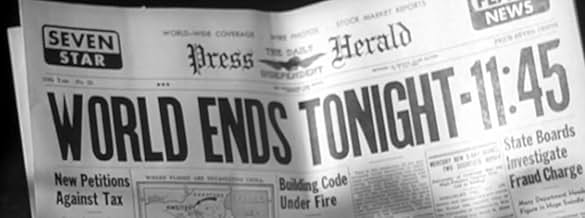A newsman plays a joke on a homeless man by showing him a fake article that says the world is going to end that night, but the prank has deadly results.A newsman plays a joke on a homeless man by showing him a fake article that says the world is going to end that night, but the prank has deadly results.A newsman plays a joke on a homeless man by showing him a fake article that says the world is going to end that night, but the prank has deadly results.
- Director
- Writers
- Stars
- Security Guard
- (as Joe Marr)
- Timothy
- (as Mike Ross)
- Director
- Writers
- All cast & crew
- Production, box office & more at IMDbPro
Featured reviews
How can he believe it?!
This episode ranks high on the unbelievability factor. Had the old man been severely brain injured or developmentally delayed, the story would have made more sense....but him believing the world is ending is awfully farfetched....awfully. And, to base the story on something so ridiculous really makes this one a tough one to love, though Collins does a nice job playing the lead in this one.
Curious story
11:45 PM.
One horrific joke. Russell Collins (known for BAD DAY AT BLACK ROCK), plays a lost soul who hangs out at a bar, bumming for booze. Wise guy newspaper reporter Harold J. Stone (Halloran) has a bogus front page printed up for kicks, the explosive headline declaring the world will END at exactly 11:45PM. Mars will collide with Earth!
Poor Johnny (Collins) gets the front row seat to the news bulletin, courtesy of big mouth Halloran. He tosses in the towl and decides to venture off and do some good deeds -- like breaking into a sports store and unloading all the goodies for the poor street kids. After all, everybody is gonna' die anyway, right? However, what happens when a guard is killed?
Worse yet... there isn't any other newspapers reporting on the end of the world!
A delicious tale of revenge, Hitchcock style, and as if we all didn't know Halloran was going to get his just desserts. One you have to stay to watch the gruesome endgame. A grande finale if there ever was.
Excellent direction by Justin Addiss, Russell Collins in one of his best roles.
One of sixteen classic stories written by Bernard C. Schoenfeld. Harold J. Stone, as always, an actors actor. Edith Barrett plays Felicia, known for film classics like SONG OF BERNADETTE and JANE EYRE.
SEASON 2 EPISODE 31 remastered Universal dvd box set. 16 hrs running time. All seven seasons are now on dvd in a single box set Released 2022.
A Painful Joke
The world's end
"The Night the World Ended" was so much better than expected. It is a long way from a great or perfect episode, but it was not as unappealing as the plot synopsis made out, it is much more interesting and it is a long way from being one of the worst 'Alfred Hitchcock Presents' episodes (despite being one of the lowest rated). Addiss did better outings in the series but he also did worse, the biggest examples on both counts have been mentioned already. This is somewhere in the middle for him.
It is definitely not an episode for everybody. The story does stretch credibility a lot and to beyond breaking point, some of it also being quite predictable. Did think that the behaviour of the characters was rather too cruel, even for behaviour intended to be.
Maybe the dialogue could have been tighter in places as well as the pace early on.
However, "The Night the World Ended" is very well acted. Russell Collins has a very difficult role here, namely on a psychological level, and he is excellent. Succeeding in creating a character that never comes over as a caricature and one that is easy to feel pity for, in fact the psychological complexity of his character is what makes the episode interesting and made it less far fetched than it could have been. Addiss directs with assurance and amps up the tension very well, of which there is quite a sizeable amount in the second half where the momentum speeds up.
As well as the tension, there is an almost surreal quality tonally that is akin to something like 'The Twilight Zone'. And parts that have emotional impact, such as with the homeless children which is very moving. The ending is enormously satisfying and the kind of ending that is rooted for early on. The writing on the whole has the right amount of edge. Hitchcock's contribution is typically ironic, while the episode looks slick. The theme music is wonderfully macabre and always was an inspired choice of music.
Concluding, a lot better than expected even if it is very easy to see why it won't click with some. 7/10.
Did you know
- TriviaFeatures an early performance by Harry Shearer as the eldest street kid.
- GoofsWhen Jim, the bar patron, begins putting his glass down on the counter, he does so with his right hand. In the next shot from another angle, his left hand is putting the glass down.
- Quotes
Self - Host: [afterword]
Self - Host: [Hitchcock is still standing by the switch] Well, it couldn't have happened to a nicer fellow. Unfortunately, justice had to be meted out to Johnny Gin. However, that is all for this evening. I hope you will join us next time when we shall return with another story. We also hope to have the er, bugs out of this little device.
[points to the switch and flips it down, but it doesn't work now]
Self - Host: Good night.
- SoundtracksFuneral March of a Marionette
Written by Charles Gounod
Details
- Runtime
- 30m
- Color
- Aspect ratio
- 1.33 : 1





















